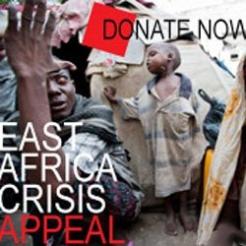Andrew Chaggar asks why slow onset disasters take so long to drive press attention, and ultimately, donations for aid.
While I’m currently half a world away in Haiti, as an aid worker I’m also following the unfolding food crisis in the Horn of Africa.
Between Ethiopia, Somalia, Kenya and Djibouti over ten million people are in need of aid and the World Food Programme recently declared the situation the “highest global humanitarian priority”.
In response to the emergency, international NGOs, including many members of the UK’s Disasters Emergency Committee (DEC), are working round the clock to prevent potentially huge numbers of deaths.
The situation is beyond awful, but perhaps the biggest tragedy is that this crisis, even more than other so called ‘natural’ disasters, was largely preventable.
Disasters are closely linked to development status and, as a result, the poor and marginalised are always the most vulnerable to hazardous events. In Haiti, for example, one of the reasons that the earthquake proved so disastrous was that, for largely man-made reasons, many of the country’s poor were crammed into the slums of Port-au-Prince.
Likewise in Africa, while much has been said about the influence of the region’s worst drought in sixty years, it is only in combination with years of conflict, chronic poverty and rising food prices that the lack of rain is now causing such hardship. As is often the case with droughts and famines, food is still available but the poor lack the resources to access it. So, again, a natural hazard, the drought, is interacting with man-made vulnerability to become disastrous.
While common points are shared between these disasters, there are also important fundamental differences between the earthquake in Haiti and the drought in East Africa.
Haitians suffered years of hardship before the earthquake, but the disaster itself struck quickly and essentially without warning. Large-scale relief was on-route within days. In Africa the Famine Early Warning System Network was reporting warnings of this crisis a year ago, but it is only in the past few weeks that the world has started paying attention.
Had the early warnings been heeded by the international community and donors, the longer lead time should have enabled mitigation, or even prevention, of the current emergency. Instead, as is often the case with such “slow-onset” emergencies, the major response only began once the situation had already become acute.
This delayed response is not because NGOs weren’t paying attention but because they were constrained by a lack of funds. NGOs are very reliant on the media to raise awareness and funding without which they can’t operate.
“Slow-onset” disasters, like drought and famine, often don’t attract media attention until the situation becomes desperate. Once the desperation sets in, the media begins to pay attention, the money starts to flow and NGO’s are able to respond.
So, as the current food crisis only became mainstream news a few weeks ago it is only in the same period that the response could begin scaling up to meet the needs on the ground.
This is a case of history repeating itself in many ways as the same was true in the Ethiopian famine of the early eighties. NGO’s on the ground were appealing for help from early 1983 but the international community only seriously became involved following Michael Buerk’s now famous “biblical famine” broadcast on the BBC late the following year.
This delayed response to the crisis in East Africa is problematic for many reasons. Not only has suffering been needlessly exacerbated but the situation is now so desperate that work will focus on life-saving operations. While this emergency response is obviously now essential it will be unlikely to do much to tackle the underlying root-causes of the crisis and those affected will be likely to be even more vulnerable to future shocks.
It’s been shown time and time again that proactive investment to prevent catastrophe requires much less resources than later responses that react to disaster. Essentially more can be done earlier with less money. However for this to happen it’s not just niche NGOs and specialist media outlets like AlertNet that must pay attention, but the rest of the world as well.
Ultimately we have both the knowledge and ability to prevent people from starving. However the sad question remains: do we have the collective will to act?









